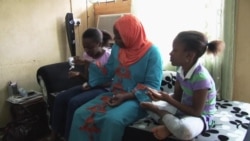Nigeria has not had a new confirmed case of Ebola for more than a month, after initially confirming 19 cases and reporting eight deaths starting in late July.
Health officials have praised the country’s health services for their quick response to the crisis. But, people around the commercial capital, Lagos vow to stay vigilant.
Ships and Stores
One of the largest ports in Africa, the Apapa Port complex in Lagos docks 50 ships a day from around the world.
At Apapaex Nigerian health officials board the 180-meter Pintail, a Cyprus-flagged cargo ship with 19 Ukrainian crew members.
By order of the Nigerian government, each crew member’s temperature is taken by health officials and recorded in a manifest.
“Temperature - again and again," said Ruslan Bosenko, the ship’s captain. "What we can do, this is our health. We must make all precaution.”
Part of the new normal, as Nigeria fights to keep the Ebola virus from entering the country again.
“Even as we have gotten a hold on the outbreak in Nigeria, the fact that the disease continues to rage in other West African countries means that we cannot let our guard down,” said Dr. Faisal Shuaib, the incident manager of the Nigerian National Ebola Emergency Center.
That sentiment is echoed throughout Nigerian society.
In the upscale neighborhood of Ikoyi, the Mopheth Pharmacy is taking measures to guard the health of both employees and patrons.
Each customer’s temperature is taken upon entry. And a hand sanitizer dispenser is being installed by the door.
“First and foremost we have a responsibility as a community pharmacy to take care of the public as well as our staff," said Ifeoma Nwagaeu, the assistant pharmacy manager. "Our priority was to make sure that our customers that can in here felt safe.”
Hand sanitizers
Hand sanitizers are in demand around Lagos. And at one point there was a shortage in the city.
“I feel like protecting myself. Documentation says that if you wash your hands or use hand sanitizer then at least you are protected," said computer engineer Michael Ukpong, who stopped into Mopheth Pharmacy to buy another bottle. "So right now it has become like a habit. Everywhere you go, you find everybody with a sanitizer.”
At the Adsobe household, hygiene has become priority number one.
Zainab and her three children are constantly washing their hands and using hand sanitizers. She worries about her children and the contact they have with people outside of the house.
“The kids are being told how to take care of themselves. Wash their own hands too, regularly. Take their bath often," Zainab said. "And avoid body contact with people they don’t know, strangers.”
In a deeply social country, where greeting a friend with less than a handshake was once considered insulting, change has not come easy. But for now, caution rules the day.
This report is part of a project on Ebola produced in cooperation with the U.S. State Department.





